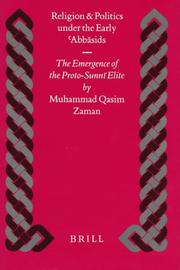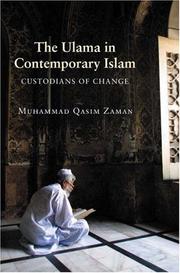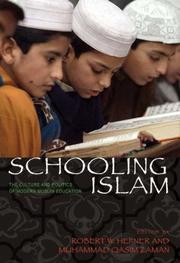| Listing 1 - 9 of 9 |
Sort by
|
Book
ISBN: 9781107096455 1107096456 9781107422254 1107422256 9780511973062 9781139571234 1139571230 9781139569422 1139569422 0511973063 1139572989 9781139572989 1316090450 9781316090459 1139579800 9781139579803 1107255066 9781107255067 1283637731 9781283637732 1139570323 9781139570329 Year: 2012 Publisher: Cambridge ; New York : Cambridge University Press,
Abstract | Keywords | Export | Availability | Bookmark
 Loading...
Loading...Choose an application
- Reference Manager
- EndNote
- RefWorks (Direct export to RefWorks)
Among traditionally educated scholars in the Islamic world there is much disagreement on the crises that afflict modern Muslim societies and how best to deal with them, and the debates have grown more urgent since 9/11. Through an analysis of the work of Muhammad Rashid Rida and Yusuf al-Qaradawi in the Arab Middle East and a number of scholars belonging to the Deobandi orientation in colonial and contemporary South Asia, this book examines some of the most important issues facing the Muslim world since the late nineteenth century. These include the challenges to the binding claims of a long-established scholarly consensus, evolving conceptions of the common good, and discourses on religious education, the legal rights of women, social and economic justice and violence and terrorism. This wide-ranging study by a leading scholar provides the depth and the comparative perspective necessary for an understanding of the ferment that characterizes contemporary Islam.
Islam --- Islamic sociology --- doctrines --- Islamic sociology. --- 297 --- Dogma, Islamic --- Islamic theology --- Kalam --- Muslim theology --- Theology, Islamic --- Theology, Muslim --- Muslim sociology --- Sociology, Islamic --- Sociology --- Doctrines. --- Islam. Mohammedanisme --- Doctrines --- Arts and Humanities --- History --- Islam - 21st century --- Islam - Doctrines

ISBN: 9004106782 9004493190 Year: 1997 Publisher: Leiden : E.J. Brill,
Abstract | Keywords | Export | Availability | Bookmark
 Loading...
Loading...Choose an application
- Reference Manager
- EndNote
- RefWorks (Direct export to RefWorks)
Islam and politics --- -Ulama --- -Ulema --- Islam --- Muslim scholars --- Politics and Islam --- Political science --- Functionaries --- Political aspects --- Islamic Empire --- -Arab countries --- Arab Empire --- Empire, Islamic --- Middle East --- Muslim Empire --- Politics and government --- History --- -Islamic Empire --- -Politics and government --- Ulama --- Ulema --- Politics and government.

ISBN: 1282964682 9786612964688 1400837510 9781400837519 0691096805 9780691096803 9780691130705 0691130701 9781282964686 6612964685 Year: 2002 Publisher: Princeton, N.J. Princeton University Press
Abstract | Keywords | Export | Availability | Bookmark
 Loading...
Loading...Choose an application
- Reference Manager
- EndNote
- RefWorks (Direct export to RefWorks)
From the cleric-led Iranian revolution to the rise of the Taliban in Afghanistan, many people have been surprised by what they see as the modern reemergence of an antimodern phenomenon. This book helps account for the increasingly visible public role of traditionally educated Muslim religious scholars (the `ulama) across contemporary Muslim societies. Muhammad Qasim Zaman describes the transformations the centuries-old culture and tradition of the `ulama have undergone in the modern era--transformations that underlie the new religious and political activism of these scholars. In doing so, it provides a new foundation for the comparative study of Islam, politics, and religious change in the contemporary world. While focusing primarily on Pakistan, Zaman takes a broad approach that considers the Taliban and the `ulama of Iran, Egypt, Saudi Arabia, India, and the southern Philippines. He shows how their religious and political discourses have evolved in often unexpected but mutually reinforcing ways to redefine and enlarge the roles the `ulama play in society. Their discourses are informed by a longstanding religious tradition, of which they see themselves as the custodians. But these discourses are equally shaped by--and contribute in significant ways to--contemporary debates in the Muslim public sphere. This book offers the first sustained comparative perspective on the `ulama and their increasingly crucial religious and political activism. It shows how issues of religious authority are debated in contemporary Islam, how Islamic law and tradition are continuously negotiated in a rapidly changing world, and how the `ulama both react to and shape larger Islamic social trends. Introducing previously unexamined facets of religious and political thought in modern Islam, it clarifies the complex processes of religious change unfolding in the contemporary Muslim world and goes a long way toward explaining their vast social and political ramifications.
Muslim scholars. --- Ulama. --- Islamic scholars --- Scholars, Muslim --- Scholars --- Ulema --- Islam --- Muslim scholars --- Functionaries --- Ulama --- #SBIB:316.331H421 --- #SBIB:39A10 --- Morfologie van de godsdiensten: Islam --- Antropologie: religie, riten, magie, hekserij --- Islam and politics. --- Ulémas --- Islam et politique --- Political sociology --- Middle East
Book
ISBN: 9789004493193 9789004106789 Year: 1997 Publisher: Leiden; Boston : BRILL
Abstract | Keywords | Export | Availability | Bookmark
 Loading...
Loading...Choose an application
- Reference Manager
- EndNote
- RefWorks (Direct export to RefWorks)
The main concern of this book is the religious policies of the early 'Abbāsid caliphs. It focuses on the religious trends which went into the making of Sunnī Islam, and traces the emergence of the nascent Sunnī elite in relation to the 'Abbāsids. Various aspects of the caliphs' evolving relationship with the religious scholars are studied and the nature of caliphal patronage and its impact on the scholars, and ultimately on the evolution of early Sunnism, is explored. What emerges is a picture of close collaboration between the caliphs and the 'ulama', with the caliphs playing an active and multifaceted role in religious life. This book challenges the prevailing interpretations of the separation of religion and politics in early Islam, and offers new insights into the social and religious history of Islam's formative centuries.
Islam and politics --- Ulama --- Islamic Empire --- Politics and government.
Book
ISBN: 9780691135878 0691135878 9780691135885 0691135886 1400833809 Year: 2009 Publisher: Princeton Princeton University Press
Abstract | Keywords | Export | Availability | Bookmark
 Loading...
Loading...Choose an application
- Reference Manager
- EndNote
- RefWorks (Direct export to RefWorks)
The most authoritative anthology of Islamist textsThis anthology of key primary texts provides an unmatched introduction to Islamist political thought from the early twentieth century to the present, and serves as an invaluable guide through the storm of polemic, fear, and confusion that swirls around Islamism today. Roxanne Euben and Muhammad Qasim Zaman gather a broad selection of texts from influential Islamist thinkers and place these figures and their writings in their multifaceted political and historical contexts. The selections presented here in English translation include writings of Ayatollah Khomeini, Usama bin Laden, Muslim Brotherhood founder Hasan al-Banna, and Moroccan Islamist leader Nadia Yassine, as well as the Hamas charter, an interview with a Taliban commander, and the final testament of 9/11 hijacker Muhammad Ata.Illuminating the content and political appeal of Islamist thought, this anthology brings into sharp relief the commonalities in Islamist arguments about gender, democracy, and violence, but it also reveals significant political and theological disagreements among thinkers too often grouped together and dismissed as extremists or terrorists. No other anthology better illustrates the diversity of Islamist thought, the complexity of its intellectual and political contexts, or the variety of ways in which it relates to other intellectual and religious trends in the contemporary Muslim world.
Islam --- Religion and politics --- Islamic fundamentalism --- Islamic modernism --- -Islam --- -Religion and politics --- -Islamic fundamentalism. --- Islamic modernism. --- 297*35 --- Modernism, Islamic --- Fundamentalism, Islamic --- Islamism --- Religious fundamentalism --- Political science --- Politics, Practical --- Politics and religion --- Religion --- Religions --- Mohammedanism --- Muhammadanism --- Muslimism --- Mussulmanism --- Muslims --- Islam en het Westen --- Religious aspects --- Political aspects --- Islamic fundamentalism. --- Fundamentalismus --- Fundamentalismus. --- Islam. --- 297*35 Islam en het Westen --- SOCIAL SCIENCE / Islamic Studies. --- Arab socialism. --- Balfour Declaration. --- Bloom, Mia. --- Chechnya. --- Constitution of Medina. --- Dehlawi, Waliyyullah. --- Egyptian Free Officers. --- French Revolution. --- Gubar, Susan. --- Hassan, Riffat. --- Hussein, Saddam. --- Ibn Mardawayh. --- Islam Online. --- Islamic Jihad. --- Jad al-Haqq, Shaykh. --- Judaism. --- Kuwait. --- Lybarger, Loren. --- Majlis Shura. --- Marxism. --- Mary (Maryam). --- Montesquieu. --- Nasserism. --- Occupied Territories. --- Orientalism. --- Palestine. --- Palestinian Authority. --- Palestinians. --- Qana massacre. --- al-Azmeh, Aziz. --- al-Ghazali, Muhammad. --- anti-Semitism. --- benevolent societies. --- capitalism. --- communism. --- dignity. --- economics. --- ethics. --- family rights. --- fasting. --- female genital mutilation. --- free will. --- globalization. --- hadith. --- honor killing. --- imam. --- imperialism/imperialists. --- intellectuals. --- justice. --- liberalism. --- madhhabs (schools of law). --- modernists. --- monasticism. --- nationalism. --- Religion et politique --- Modernisme islamique. --- Integrisme islamique. --- Islamisme --- Religion and politics. --- Histoire. --- Histoire --- Islamic countries. --- Muslim countries --- Islam - 20th century --- Islam - 21st century --- Religion and politics - Islamic countries --- Et l'islamisme --- Intégrisme islamique --- Islamisme politique --- Islamisme radical --- Islamistes --- Mouvements islamistes --- Islamisme et antisémitisme --- Djihadistes --- Propagande islamiste --- Terrorisme islamiste --- Idées politiques --- Islam et politique --- Intégrisme --- Fondamentalisme --- Modernisme islamique --- Fondamentalisme religieux --- Philosophie islamique --- Idéologie et religion --- Politique et religion --- Politique --- Pratiques politiques --- Science politique --- Religion et État --- Clergé --- Intolérance religieuse --- Hindouisme et politique --- Judaïsme et politique --- Libéralisme --- National-socialisme et religion --- Nationalisme --- Pluralisme religieux --- Relations internationales --- Religion égyptienne et politique --- Religion grecque et politique --- Bible et politique --- Sikhisme et politique --- Socialisme et religion --- Terrorisme --- Théologie politique --- Tolérance religieuse --- Bouddhisme et politique --- Christianisme et politique --- Communisme et religion --- Confucianisme et politique --- Conservatisme --- Droite religieuse --- Gauche religieuse --- Aspect politique --- Aspect religieux --- Activité politique

ISBN: 1400837456 9786612964664 1282964666 9781400837458 9780691129327 0691129320 9780691129334 0691129339 6612964669 9781282964662 Year: 2007 Publisher: Princeton (N.J.) Princeton University Press
Abstract | Keywords | Export | Availability | Bookmark
 Loading...
Loading...Choose an application
- Reference Manager
- EndNote
- RefWorks (Direct export to RefWorks)
Since the Taliban seized Kabul in 1996, the public has grappled with the relationship between Islamic education and radical Islam. Media reports tend to paint madrasas--religious schools dedicated to Islamic learning--as medieval institutions opposed to all that is Western and as breeding grounds for terrorists. Others have claimed that without reforms, Islam and the West are doomed to a clash of civilizations. Robert Hefner and Muhammad Qasim Zaman bring together eleven internationally renowned scholars to examine the varieties of modern Muslim education and their implications for national and global politics. The contributors provide new insights into Muslim culture and politics in countries as different as Morocco, Egypt, Pakistan, India, Indonesia, Iran, and Saudi Arabia. They demonstrate that Islamic education is neither timelessly traditional nor medieval, but rather complex, evolving, and diverse in its institutions and practices. They reveal that a struggle for hearts and minds in Muslim lands started long before the Western media discovered madrasas, and that Islamic schools remain on its front line. Schooling Islam is the most comprehensive work available in any language on madrasas and Islamic education.
Comparative education. --- Religion and culture. --- Religion and politics. --- Islam and politics. --- Madrasahs. --- Islamic religious education. --- Education, Comparative --- Education --- Culture and religion --- Culture --- Political science --- Politics, Practical --- Politics and religion --- Religion --- Religions --- Islam --- Politics and Islam --- Madrasas --- Madrasehs --- Madrassahs --- Madrassas --- Medreses --- Medressehs --- Islamic religious education --- Schools --- Muslims --- Muslim religious education --- Religious education, Islamic --- Islamic education --- Religious education --- History --- Religious aspects --- Political aspects --- Education religieuse islamique --- Madrasa --- Islam et politique --- Religion et politique --- Religion et culture --- Education comparée --- Madrasahs --- Islam and politics --- Religion and politics --- Religion and culture --- Comparative education
Book

ISBN: 9780691134840 0691134847 140083855X 128385130X 1782688803 9781400838554 9781782688808 Year: 2013 Publisher: Princeton (N.J.) Princeton University Press
Abstract | Keywords | Export | Availability | Bookmark
 Loading...
Loading...Choose an application
- Reference Manager
- EndNote
- RefWorks (Direct export to RefWorks)
The first encyclopedia of Islamic political thought from the birth of Islam to today, this comprehensive, authoritative, and accessible reference provides the context needed for understanding contemporary politics in the Islamic world and beyond. With more than 400 alphabetically arranged entries written by an international team of specialists, the volume focuses on the origins and evolution of Islamic political ideas and related subjects, covering central terms, concepts, personalities, movements, places, and schools of thought across Islamic history. Fifteen major entries provide a synthetic treatment of key topics, such as Muhammad, jihad, authority, gender, culture, minorities, fundamentalism, and pluralism. Incorporating the latest scholarship, this is an indispensable resource for students, researchers, journalists, and anyone else seeking an informed perspective on the complex intersection of Islam and politics. Includes more than 400 concise, alphabetically arranged entries Features 15 in-depth entries on key topics Covers topics such as: Central themes and sources of Islamic political thought: caliph, modernity, knowledge, shari'a, government, revival and reform Modern concepts, institutions, movements, and parties: civil society, Islamization, secularism, veil, Muslim Brotherhood Islamic law and traditional Islamic societies: justice, taxation, fatwa, dissent, governance, piety and asceticism, trade and commerce Sects, schools, regions, and dynasties: Mu'tazilis, Shi'ism, Quraysh, Mecca and Medina, Baghdad, Indonesia, Nigeria, Central Asia, Ottomans Thinkers, personalities, and statesmen: Mawardi, Shafi'I, Saladin, Tamerlane, Akbar, Atatürk, Nasser, Khomeini Contains seven historical and contemporary maps of Muslim empires, postcolonial nation-states, populations, and settlements Guides readers to further research through bibliographies, cross-references, and an index
Political science --- Islam and politics --- Science politique --- Islam et politique --- Encyclopedias --- Encyclopédies --- 297 --- Islam. Mohammedanisme --- Encyclopédies --- Islam --- Politics and Islam --- Administration --- Civil government --- Commonwealth, The --- Government --- Political theory --- Political thought --- Politics --- Science, Political --- Political aspects --- Social sciences --- State, The --- Political science - Islamic countries - Encyclopedias --- Political science - Islamic Empire - Encyclopedias --- Islam and politics - Encyclopedias
Multi

ISBN: 9780691194165 9780691190754 0691190755 Year: 2019 Publisher: Princeton, N.J. Princeton University Press
Abstract | Keywords | Export | Availability | Bookmark
 Loading...
Loading...Choose an application
- Reference Manager
- EndNote
- RefWorks (Direct export to RefWorks)
History --- Religion --- Secularism --- Religious studies --- World history
Book

ISBN: 9780691190754 0691190755 0691194165 0691205213 Year: 2019 Publisher: Princeton University Press
Abstract | Keywords | Export | Availability | Bookmark
 Loading...
Loading...Choose an application
- Reference Manager
- EndNote
- RefWorks (Direct export to RefWorks)
Religion --- Secularism --- Ethics --- Irreligion --- Utilitarianism --- Atheism --- Postsecularism --- Secularization (Theology) --- Religion, Primitive --- Religions --- Theology --- History --- Religious studies --- World history
| Listing 1 - 9 of 9 |
Sort by
|

 Search
Search Feedback
Feedback About UniCat
About UniCat  Help
Help News
News